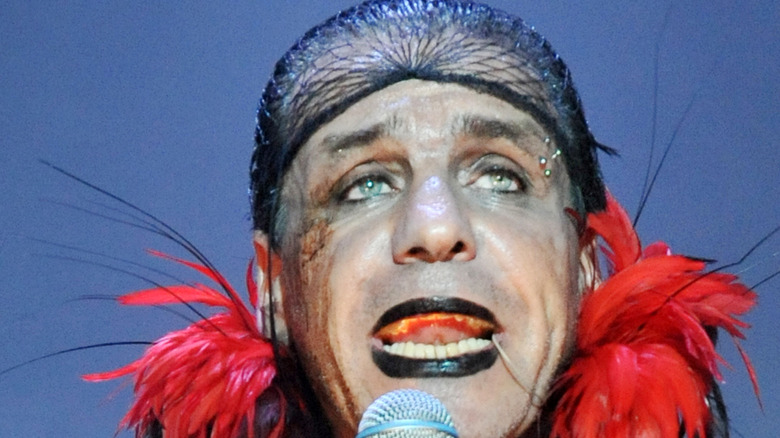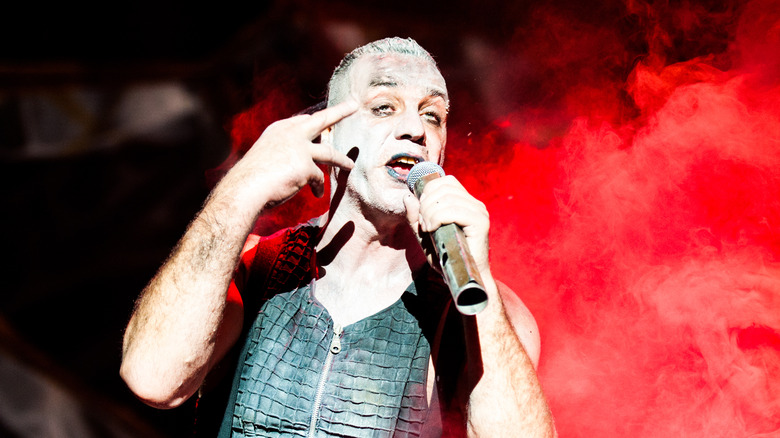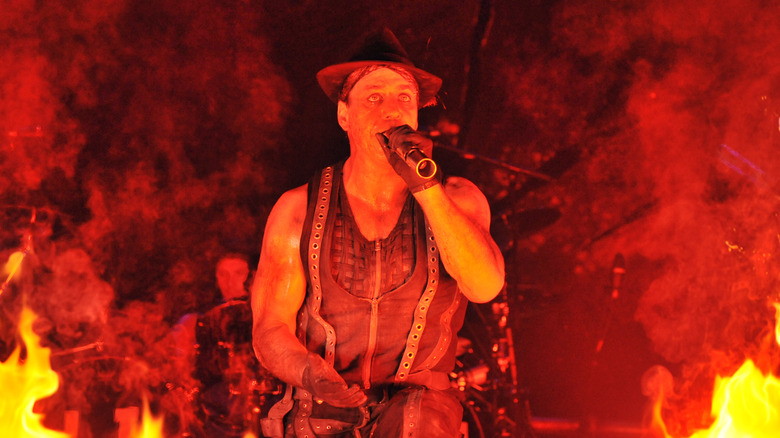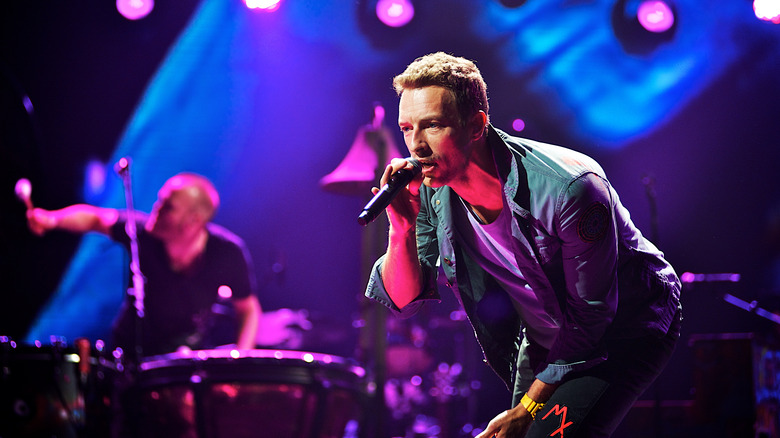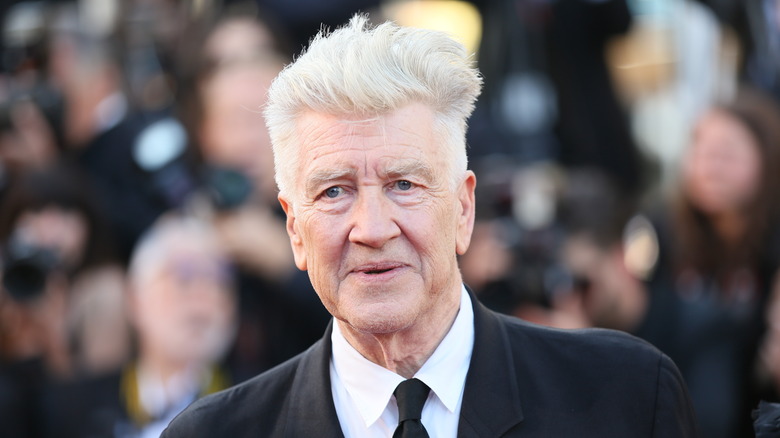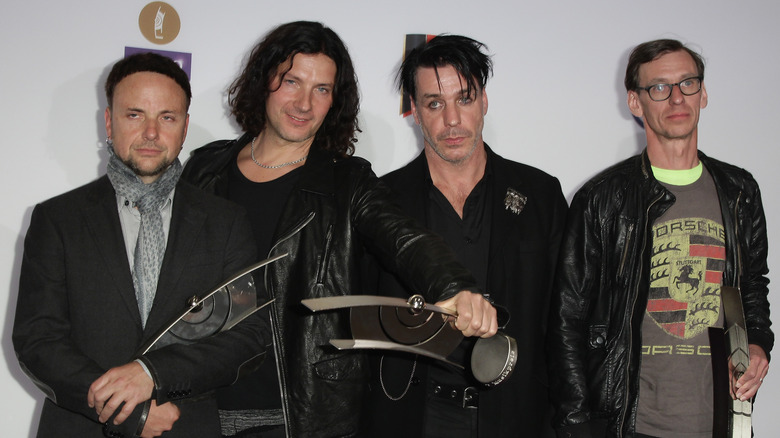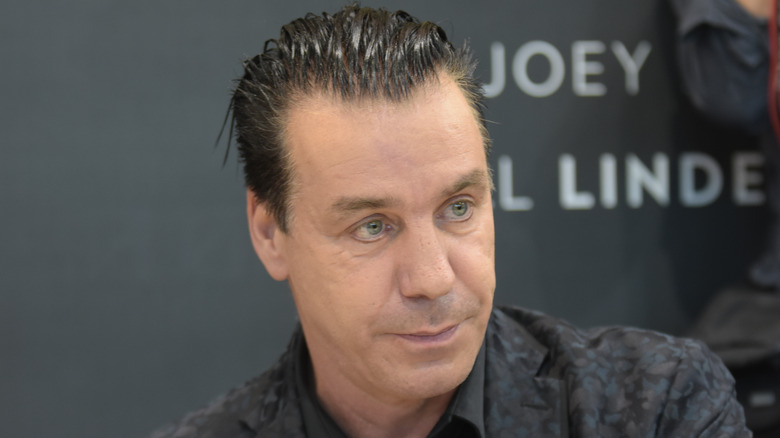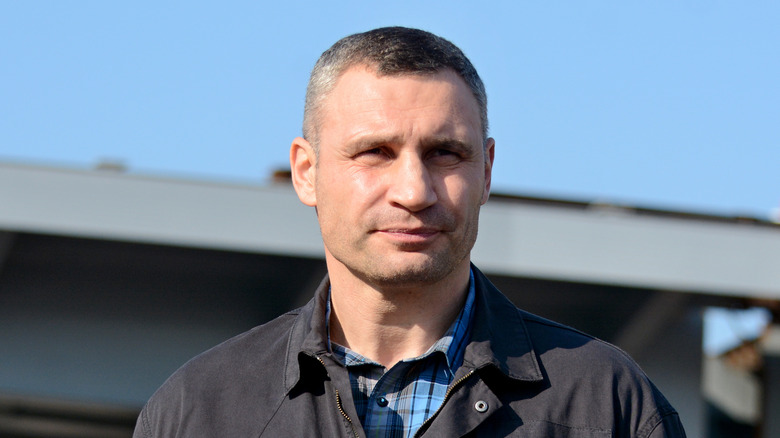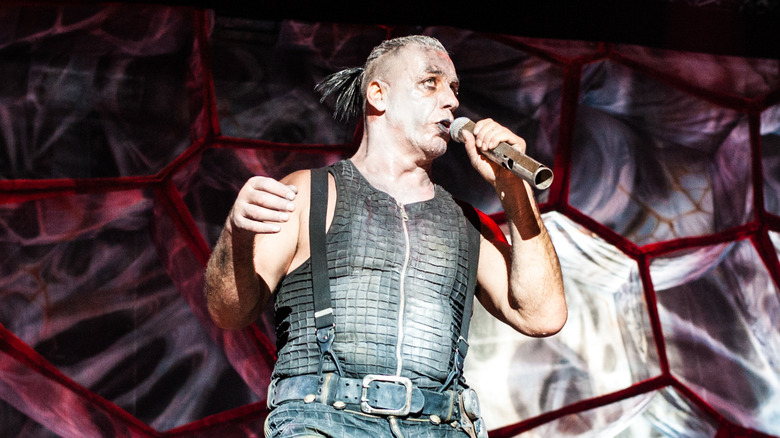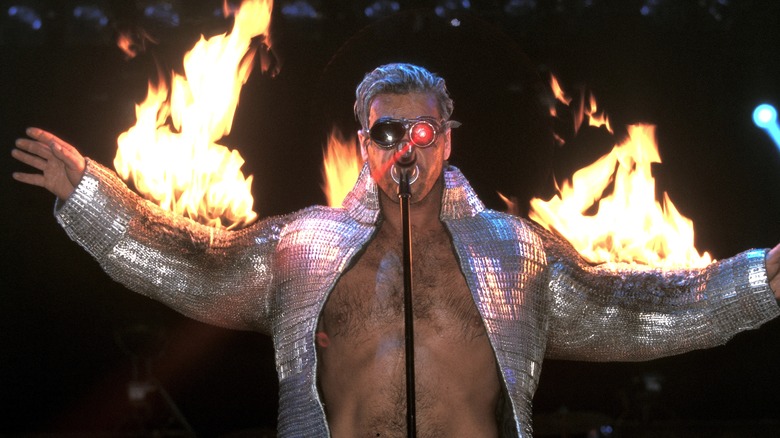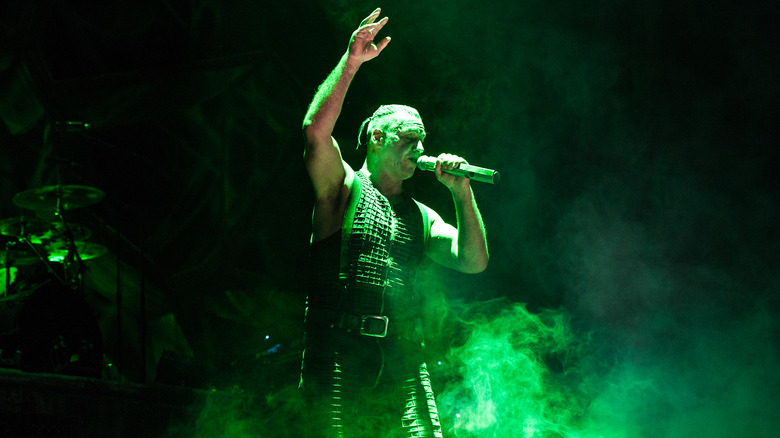The Untold Truth Of Rammstein
Energy and intensity. Those are the two words that best describe the German industrial sextet known as Rammstein. Despite being around for nearly three decades, the band has yet to experience any member changes as everyone has remained firmly committed to the cause (via Encyclopedia.com). It goes to show that while the performances might be highly explosive and out of control, the bandmates know that they're the sum of all their parts and no one person is more important than the other.
While the consistent lineup has helped them become a force of nature in music, and even pick up two Grammy Award nominations in the process, they're also widely renowned for their controversial nature — both on and off the stage. Some of the stories surrounding their exploits have made international headline news, with a few members landing up in jail for indecency and even the band being sued by a cannibal for taking inspiration from his crime for one of their songs. So turn up the volume to 11, stomp along to the insatiable marching beat of "Ich will," and discover the untold truth about Rammstein.
Rammstein's Deutschland music video didn't go down well
A music video is a fantastic promotional vehicle for a new single or album. It's also a potential revenue earner in the age of YouTube as advertisers attach themselves to the content. In fact, according to Vevo (via Music Ally), brands tend to shine brighter when they're associated with music videos because of the emotion that's stirred from the artist's music. In the case of Rammstein, they certainly evoke something from the audience; it's called shock. After all, there's a reason they're able to have an entire list of the most controversial videos based purely on their work.
In March 2019, Rammstein released the nine-minute-plus video for their new single "Deutschland," which was off their self-titled album, and it didn't take too long for it to ruffle a few feathers. Per BBC News, Emmanuel Nahson, then-spokesman for the Israeli foreign ministry, was unimpressed by the video — at one point, the band was dressed up as Nazi concentration camp prisoners with nooses around their necks. In a now-deleted tweet, Nahson called the video "shameful and uncalled for." Dr. Alexandra Lloyd, a lecturer at the University of Oxford, broke down the video's meaning to Louder, explaining that it's actually an accurate depiction of German history — showcasing the brutal honesty of the country's past. The question is, was Rammstein using art to address the band's complicated relationship with their own country's past, or was the "Deutschland" music video deliberately created for shock value?
The band bled for their music, seriously
There's a danger and thrill associated with a Rammstein show. With all the blazing pyrotechnics and high-intensity performances on display, there's always the chance that something could go up in smoke or someone could get seriously hurt in the process. But isn't rock 'n' roll supposed to be dangerous and unpredictable? As it turns out, the German rockers are just as bold and daring behind the scenes as well.
Director Zoran Bihać has made quite a few videos with the band over the years; however, even he was left shocked by their ferocious approach to the "Rosenrot" music video. Bihać explained to Louder how the concept called for Rammstein to whip each other, and he suggested they use special effects to showcase their wounds and blood, but the group had other intentions. "The band took me aside and said, 'Come on, we'll drink vodka and do it ourselves,'" Bihać said. "The blood that you see, the wounds, it's real stuff, they all went off to this tent that we had for the shoot, drunk a liter of vodka and then they just kept on rocking and went for it and that was it." And Jared Leto calls himself a method actor by sending dead rats to his castmates while Rammstein does this, huh.
The band was sued by a cannibal
Judging by the lyrical content of the rest of their discography, it should come as no surprise that Rammstein wrote a song about arguably the most infamous cannibal of all time. The riff-heavy single "Mein Teil," off 2004's "Reise, Reise," was influenced by the real-life story of Armin Meiwes, as per AFP (via Taipei Times). Meiwes posted an online ad looking for a willing participant to be killed and eaten, and Bernd-Jürgen Brandes responded (via BBC News). The two met up and the spine-chilling dinner date's events were captured on camera. Rammstein wanted to use snippets from the recording in the "Mein Teil" music video, according to MTV, but the footage was still in the police's custody at the time. So they proceeded with an altogether different — yet still provocative — concept for the video that raised more than a few eyebrows upon its release.
Reportedly, Meiwes wasn't happy about a song being made on the back of his story and filed legal action against Rammstein in 2006, as per a United Press International report (via Blabbermouth). The case never went anywhere, though, as Meiwes was sentenced to life imprisonment later that year, as per NBC News.
They influenced Coldplay
With Rammstein singing about politics, fairy tales, fetishes, and cannibals, one wouldn't exactly think they share too much in common with British rockers Coldplay, who possess about as much of a danger threat as a day-old artichoke on a slice of pizza. That said, Chris Martin admitted to Q (via The Guardian) that the band drew inspiration from the likes of Rammstein while working on their fourth album, "Viva la Vida or Death and All His Friends." According to Martin, producers Brian Eno and Markus Dravs helped them to step outside of their comfort zone and explore a sound that wasn't shaped by Radiohead — an obvious and distinct influence on their previous albums.
Martin wasn't just providing lip service or trying to sell the album, though, as he's proven that he's a Rammstein mega-fan at heart. As per RTL Today, Martin took some time out of his busy tour schedule and booked a private plane for him and his friends to see a Rammstein show in Luxembourg in 2019. And the best part? Martin even scored a photo with the band's frontman Till Lindemann, which is probably still the background wallpaper on his phone to this day.
David Lynch is responsible for Rammstein's breakthrough
Rammstein formed in 1994 (via Last.fm), but they were a few years away from becoming the global battering ram that we're all familiar with now. It also didn't help that the band was as progressive as it was in the quest against censorship, as guitarist Richard Kruspe said in a Louder feature, since this made the group appear rather unusual and left field to the average listener. However, it was another progressive creative icon who helped to catapult the Neue Deutsche Härte band's name into the mainstream's consciousness and got everyone singing their songs (even if they didn't always understand the lyrics).
Acclaimed filmmaker David Lynch included Rammstein in the soundtrack for his 1997 noir film "Lost Highway." Produced by Nine Inch Nails' frontman Trent Reznor, the album contained an edited version of the track "Rammstein," which was off the band's first album, "Herzeleid." Appearing alongside other established musical artists such as Lou Reed, Marilyn Manson, and David Bowie ensured that Rammstein was suddenly an act that everyone needed to pay more attention to — and they did. The rest, as they say, is history.
Two band members were arrested for indecency
Rammstein has become one of those bands where stories of their performances become the stuff of urban legend. Many fans claim to have seen and experienced things that seem far-fetched and unbelievable until the tales are proven to be fact, such as the time when Till Lindemann and keyboardist Christian Lorenz spent a night in a Massachusetts jail in 1999, as per Spin.
The two members were locked up on lewd and indecency charges after Lindemann pulled out a dildo and simulated sex with Lorenz on stage during the performance for the song "Bück dich." The arrest didn't seem to perturb the band too much, according to guitarist Paul Landers. "It was sort of interesting for us, to see that there could be parallels from communist East Germany, where we grew up, and the United States," Landers said. "We're used to all that sort of stuff, with the police getting involved."
It also wouldn't be the last time that Rammstein would have a run-in with the law, with Lindemann being questioned by Russian police for allegedly violating COVID-19 protocols in August 2021, per Bild (via Deutsche Welle).
There's a qualified pyrotechnician in the band
Mention the name Rammstein and the first thing that comes to mind is a raging fire. The sextet love nothing more than to set the stage on fire — both figuratively and literally, of course — and make a Guy Fawkes celebration seem like a candle in the wind in comparison. However, there was a time when they played with fire and nearly got burnt in 1996, as per Louder. After a burning prop nearly landed on the band during a show, the band turned to the FFP, a team that handles special effects production, to ensure that accidents wouldn't happen again.
Considering the fact that he sets himself on fire regularly, Till Lindemann took the measures to become a qualified pyrotechnician who knows how to pull off these stunts safely and spectacularly. But what is the reason for Rammstein's obsession with fire? "You have to understand that 99 percent of the people don't understand the lyrics," Richard Kruspe explained, "so you have to come up with something to keep the drama in the show." Well, in that case, feuer frei!
Rammstein sued the German government
If there's one thing that Rammstein detests, it's censorship in all forms. The band constantly fights for freedom of speech, and they even took on their country's government one time. In 2009, after the release of their controversial album "Liebe ist für alle da," the German government placed the record on the Federal Department for Media Harmful to Young Persons because of the lyrical content of the track "Ich tu dir weh" and a racy photo in the CD booklet, as per Loudwire. This meant that only people over the age of 18 could purchase the album, the record wasn't allowed to be advertised in stores, and the band couldn't play the offending track live in Germany.
Deciding to not let it go, Rammstein fought the ruling, saying the decision caused financial damage to the band and was illogical. Christian Lorenz told the Bild am Sonntag newspaper (via Loudwire) that "there's nothing on the album that could be more misinterpreted than on other Rammstein records." Justice prevailed for the band in the end, as the government lifted the ban in June 2010, allowing Rammstein to play the track in the country and for their album to be sold in stores as per usual.
The band wrote a song for Vitali Klitschko
Rammstein's songs don't just blare; they stomp a mudhole in speakers and PA systems. There's a certain swagger and kraft to their tunes, which translates well to theme music in sports. In the past, Japanese pro wrestling superstar Tetsuya Naito utilised "Du hast" as his entrance music (via Cagematch), and there was a boxing legend who almost had his own Rammstein-powered theme music chugging him along to the ring.
"Sonne," a single off 2001's "Mutter" album, was originally recorded for Vitali Klitschko, the former heavyweight championship boxer and current mayor of Kyiv (via Zeit Online). When Klitschko didn't use the track, Rammstein reworked it into "Sonne," which has gone on to become one of their biggest hits ever. In fact, the fans even voted it as the greatest Rammstein song in a Louder poll. The music video is equally memorable as it operates as a twisted and hyper-sexualized parody of "Snow White and the Seven Dwarfs" — but did we expect anything else from Rammstein here?
Till Lindemann wasn't always a singer
Undoubtedly, Till Lindemann is the face of Rammstein. The burly and instantly recognizable lead singer stands out from the pack and has become as iconic as the band he's been a part of for nearly three decades. While it's impossible to imagine anyone else gripping the mic like a megaphone for the German band, it wasn't always Lindemann's intention to become a vocalist.
As per a Louder profile on Lindemann, he began his music career as a drummer in a punk rock band called First Arsch, where he shared the stage with his future Rammstein instigators Paul Landers and Richard Kruspe. However, kismet had its say and Lindemann discovered his voice — in more ways than one. "Till radiates complete authority in my eyes," Christian Lorenz said. "When he sings or says something, you realise that he also means it. That makes the whole song a lot more precious." While Lindemann might not be smashing the skins and cymbals for Rammstein, it isn't outside of the realm of possibility to think that he might have turned into a formidable drummer in the music scene as well.
Rammstein is deliberately provocative
Make no mistake about it, Rammstein is one of those acts that give overprotective parents nightmares for weeks on end. From their freakish stage show to their controversial lyrics and eye-opening music videos, they aren't afraid to be offensive or to draw the ire of detractors and lawmakers. They don't hide from incitement either; they welcome it, even at the risk of being labeled fascists or perpetrators of right-wing propaganda due to a fundamental misunderstanding of their message.
"We are a deliberately provocative band," drummer Christoph Schneider told Kerrang! "And the high point of our provocation, of course, was that Leni Riefenstahl video [for the cover of Depeche Mode's "Stripped"]. And we did that because we wanted to shock the people who thought we were from the right; like, if you think that's how we are then, here, have something that will really shock you." That said, Schneider admitted that the band wouldn't have made the "Stripped" music video in today's climate, especially considering Riefenstahl's close ties with Adolf Hitler. Paul Landers agreed that the band wasn't afraid of attracting controversy, and while their lyrics were open to interpretation and deabute, they were certainly not promoting ay kind of right-wing propaganda.
Till Lindemann's mother loved watching Rammstein
Rammstein brings everyone together, even people who don't understand German, which once again proves that music is the universal language that connects us all. Young and old, new and longtime fans, it's not unusual to see a diverse audience having the time of their lives at the band's shows. One person who enjoyed watching the group doing what they do best was Till Lindemann's elderly mother, Brigitte 'Gitta' Lindemann.
As per Kerrang!, she believed Rammstein's shows had an operatic quality to them, and she reveled in watching her son perform at Madison Square Garden with his band. "Do you know what made the biggest impression on me?" she revealed. "The boys' courage! They don't give a s*** ... what people might think. They never did." Apart from beaming about her son's musical career, she also highlighted how proud she was of his other interests such as literature and art, as well as his tranquil demeanor when he's not on tour. Who would've thought that the hulking and provocative Lindemann would be such a sweetheart and calming influence when he is around his family?
